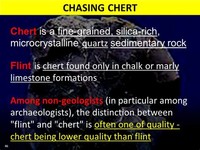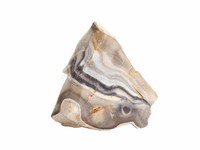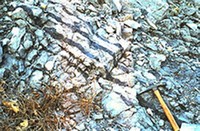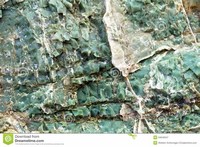Facts about Chert

Chert is a fine-grained, silica-rich, microcrystalline, cryptocrystalline or microfibrous sedimentary rock that may contain small fossils.

A primary historic use of common chert and flint was for flintlock firearms, in which the chert striking a metal plate produces a spark that ignites a small reservoir containing black powder, discharging the firearm.

Other lesser used terms for chert (most of them archaic) include, firestone, silex, silica stone and flintstone.

Among petrologists, chalcedony is sometimes considered separately from chert due to its fibrous structure.

Among non-geologists (in particular among archaeologists), the distinction between "flint" and "chert" is often one of quality—chert being lower quality than flint.

Chert occurs as oval to irregular nodules in greensand, limestone, chalk, and dolostone formations as a replacement mineral, where it is formed as a result of some type of diagenesis.

The banded iron formations of Precambrian age are composed of alternating layers of chert and iron oxides.

Like obsidian, as well as some rhyolites, felsites, quartzites, and other tool stones used in lithic reduction, chert fractures in a Hertzian cone when struck with sufficient force.

Part of chert's popularity in road surfacing or driveway construction is that rain tends to firm and compact chert while other fill often gets muddy when wet.

The cryptocrystalline nature of chert, combined with its above average ability to resist weathering, recrystallisation and metamorphism has made it an ideal rock for preservation of early life forms.

Chert has been used in late nineteenth-century and early twentieth-century headstones or grave markers in Tennessee and other regions.

Strictly speaking, the term "flint" is reserved for varieties of chert which occur in chalk and marly limestone formations.

Hauled prices for chert of less than $10 to $15 per ton are not uncommon in many parts of the U.S.
